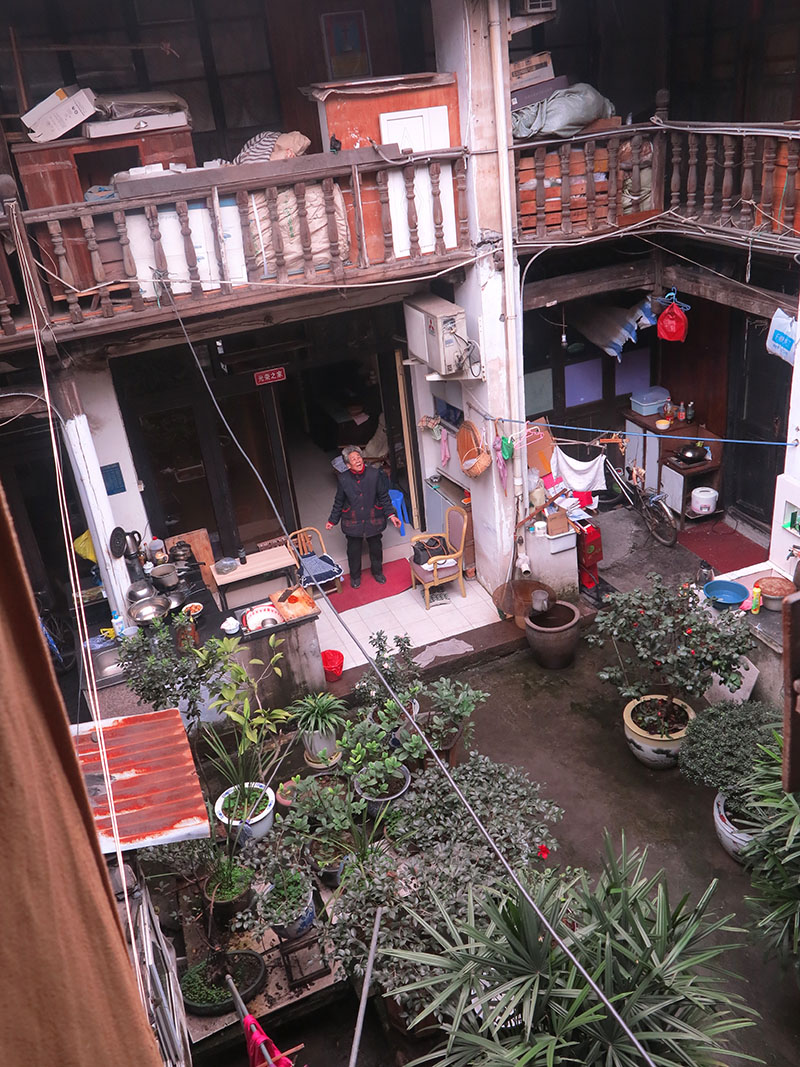
You don’t really know someone until you’ve visited his or her childhood home. The pilgrimage to the place where Chen Kai was raised has left me sobered. And a little stunned by my own naivety. The meteoric rise of the Chinese people from poverty to middle class has never been more graphically displayed to me than here today.
Leading me down narrow alleys in Wenzhou, she turned without preamble into a cavernous tunnel gateway that led into the courtyard. There, a stout gray-haired 83-year-old woman spotted Chen Kai and began shrieking a greeting and trotted over to hug us both.
Me, she practically dragged to her favorite chair and shoved me down, hands on both shoulders. I gazed about in shock.
An open air compound, two stories tall that looks like it could be the set for a Chinese version of Gershwin’s Porgy and Bess: colorful and exotic — but primitive, shabby, dilapidated, squalid, mean, dusty — like a scenario out of another decade, or century. No heat, no central plumbing, old electric wires strung haphazardly overhead.
In Chen Kai’s youth four families with the average of 10 people shared this cramped dingy space and “Everybody knew what everybody else had for dinner…there was no privacy…when the neighbors had a fight, everybody knew what it was about,” she told me.
What must it have been like to grow up here, I wondered? What other amenities of basic American life did this place lack?
Chen Kai ticked them off: no refrigerator, no clothes washer, certainly no clothes dryer or dish washer, no TV, no phone, no hot water and no toilet.
I am pole-axed. I ask for an explanation. I almost wish I hadn’t. They used what used to be called a “slop bucket,” which required daily emptying, or else someone came around occasionally to collect the raw sewage.
For bathing, the weekly bath required taking turns, and a trek to fetch the hot water from a public hot water station 200 meters out the door and down the alley, toting that water all the way back to the compound where she’d take her bath in a big wooden tub. Repeat: a wooden tub.
They did have running water and a coal-fired cook stove, but all the same, growing up here must have been like camping out in a big wooden tent.
When Chen Kai observed my slack-jawed amazement, she said with force, “You cannot imagine how poor we were at that time in China. You cannot imagine!”
Then this: “But I am not special. This is everyperson’s story in China.”
*** *** ***
When my pal, Professor Li Ren of Chongqing, arrived for the conference, I got to corroborate Chen Kai’s story with him. Li, 43, was raised in the Southwest city of Chongqing, which at the time had the gritty, grungy but scrappy look and reputation of old Pittsburgh, Pa., back in the steel days of the ‘50s.
He agreed with everything Chen Kai said, telling me that his family did not have indoor plumbing until 1992. Then he offered this narrative. “I remember when my parents got their first TV. A tiny little black and white TV. The only one in the neighborhood, and all the neighbors crowded in and watched, every night.”

The discovery of Prof Chen Kai’s rise from such poverty is an eye-opener. And it explained her life’s perspective too. An eco-friendly activist, she becomes visibly upset when she sees what she considered wasteful energy practices — like for instance how most American office buildings (including the J-School) keep their AC cranked up to near freezing temperatures, according to her.
I take notes on Chen Kai’s passionate eco-rant.
“It would take four earths if we Chinese lives like you Americans,” she exclaims, as if this is Jock Lauterer’s fault.
“You waste so much! You use so much land and water! It is an unsustainable lifestyle!” (The exclamation points here do not do her outbursts justice.)
“You always say China is the number one polluter. But we sacrifice to live as humbly as possible! (She scores a point here; Chinese, even the well-off, rarely own clothes dryers.) And off she goes again. “We are the number one population. You can imagine if everyone had a dishwasher or clothes dryer!”
And then the zinger: “If we don’t pollute as much as we do, how can we support so many people?”
While I’m trying to get my head around the logic of that curve ball, she concludes with finality, “Pollution is the price we have to pay for our development.”
By now, we are back in the car, driving in 10 lanes of bumper-to-bumper traffic. I can’t see half a mile in the smog — the filthy air the Chinese call “a cloudy day.”


